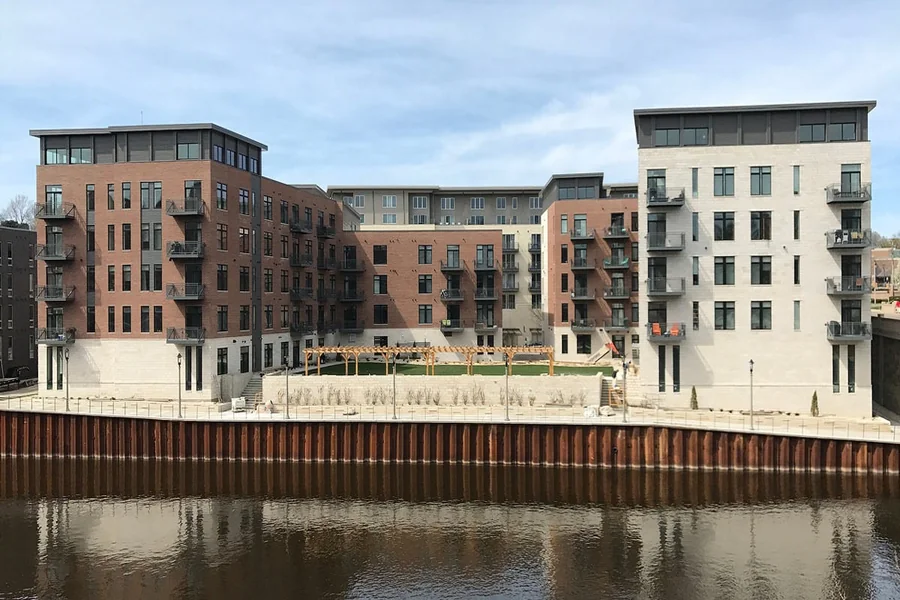ICF technology is transforming the construction industry. Insulated Concrete Forms (ICF) is a technology that involves the construction of the reinforced concrete framework filled with insulation panels to make robust and energy saving structures. Builders, architects and house owners are embracing it more since it offers quicker construction, superior insulation, and robust structures. Unlike traditional methods using bricks or wood frames, ICF technology integrates the building structure and insulation in one system.
This method makes the construction easier, less energy is used and the performance of the buildings is better in the long term. ICF technology is not only used for residential homes but also for commercial buildings, schools, and industrial projects. It has now become a necessity to the modern builders.
How ICF Technology Works
ICF technology uses hollow blocks or panels made of rigid foam, which are stacked to form walls. The hollow forms are reinforced with steel reinforcements bars. A concrete is then introduced in the forms, forming a solid insulated wall. The foam panels stand and they are used as insulation to the building.
Key components include:
- Foam panels/Blocks: Insulate and form.
- Steel reinforcement: Gives structural strength.
- Concrete core: This gives it rigidity and strength.
- Interlocking system: Makes it easy to assemble and to align.
Insulation and concrete make buildings to be strong and energy efficient as well as insulating them against environmental forces such as earthquake, storms, and fire.
Why ICF Technology Is Gaining Popularity
The main reason ICF technology is growing is its efficiency. Conventional building methods usually involve different processes in framing, insulation and pouring of concrete. ICF integrates all these steps and saves on labor costs and constructions. Constructors are able to finish walls quicker and the structure that is finished is more quality.
Another significant factor is energy efficiency. ICF walls have continuous insulation which minimizes loss or gain of heat. This reduces heating/ cooling expenses to building owners. Also, ICF walls are soundproof, thus applicable in residential and commercial construction projects in high traffic centres.
Sturdiness is also one of the benefits. ICF walls can withstand natural calamities as compared to traditional brick and wood walls. They are very fire resistant and have low chances of cracks forming with time.
Applications of ICF Technology
ICF technology is versatile. Some common uses include:
- Residential homes: The single-family and multi-family dwellings have the advantage of lower energy bills and are faster to build.
- Commercial buildings: Commercial buildings benefit with better strength of the wall and reduce the costs of operation.
- Schools: ICF is used to soundproof the schools and provide protection during severe weather.
- Industrial buildings: Factories and storage systems are fireproof and resistant.
By using ICF technology, builders can create structures that last longer and require less maintenance, making it an attractive investment.
Benefits of ICF Technology
- Energy efficiency: Continuous insulation lowers heating and cooling needs.
- Quick construction: Hybrid form and insulation makes the construction easier.
- Structural strength: concrete is made reinforced.
- Fire resistance: Concrete and foam are more resistant to fire as compared to wood frames.
- Soundproofing: The thick walls minimize the noise.
- Pest resistance: The concrete walls are not easily affected by termites and rodents.
- Less maintenance: ICF walls are durable with little maintenance.
These benefits make ICF technology appealing to homeowners, architects, and contractors alike.
Issues and Problems
While ICF technology offers many advantages, there are some challenges:
- Initial cost: The initial cost of materials and forms may be higher than a traditional construction.
- Labor specialization: The employees should be trained to deal with ICF in the right manner.
- Flexibility in design: It is necessary to plan to change the walls or create openings.
- Low supply: not all regions will have as many suppliers, or contractors who have worked with ICF.
It is clear that despite these difficulties, ICF is a cost-effective solution in the long run due to the increased energy and maintenance savings.
Materials and Tools to be used
Effective ICF construction should use quality equipment and materials:
- Interlocking foam blocks or foam panels.
- Reinforcement bars and connectors in the form of steel.
- Concrete mixers and pumps
- Tools of leveling and alignment.
- Clamping screws to hold panels.
- Material handling protective equipment.
With correct planning and the correct tools, efficient building and good quality outcomes are guaranteed.
Future of ICF Technology
The future of ICF technology looks promising. Due to the increase in energy prices and various environmental issues, construction professionals are turning to the idea of sustainability. ICF technology reduces energy consumption and carbon footprint compared to traditional methods.
The development of materials can result in lighter panels, less time in assembly, and maybe more insulating qualities. Combined with modern construction techniques, ICF technology could become the standard for energy-efficient, resilient buildings worldwide.
FAQ About ICF Technology
What is ICF technology?
ICF technology is a construction method that uses insulated concrete forms to build energy-efficient, strong, and durable walls.
How does ICF technology improve energy efficiency?
The foam panels offer total insulation which minimises heat loss and cuts on heating and cooling expenses.
Is ICF technology suitable for all types of buildings?
Yes, it may be applied in residential, commercial, educational and industrial buildings.
Are ICF walls durable?
Yes, there is the high structural strength, resistance to fire, and a long-term life of the reinforced concrete in the forms.
Does ICF technology reduce noise?
Yes, thick walls lessen the transmission of sounds and it is suitable in the schools, offices and homes.
Is ICF technology more expensive than traditional construction?
Start-up costs might be greater, but the cost can be compensated by energy savings, less maintenance and quicker building.
Are there any special training requirements in ICF by builders?
Yes, employees must know how to stack blocks and pour concrete and wall reinforcement to achieve maximum outcomes.




